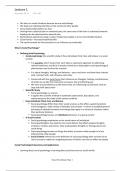Summary
Summary of Social Psychology - PSY504 (Chapters 1-11 + Appendix A)
- Course
- PSY504 (PSY504)
- Institution
- Ryerson University (Ru )
This document contains a comprehensive set of detailed notes taken from the textbook for PSY 504 (Social Psychology; Chapters 1-11 + Appendix A). The notes summarize key concepts, theories, and findings discussed in the chapters required for the course, providing a structured and accessible resourc...
[Show more]



